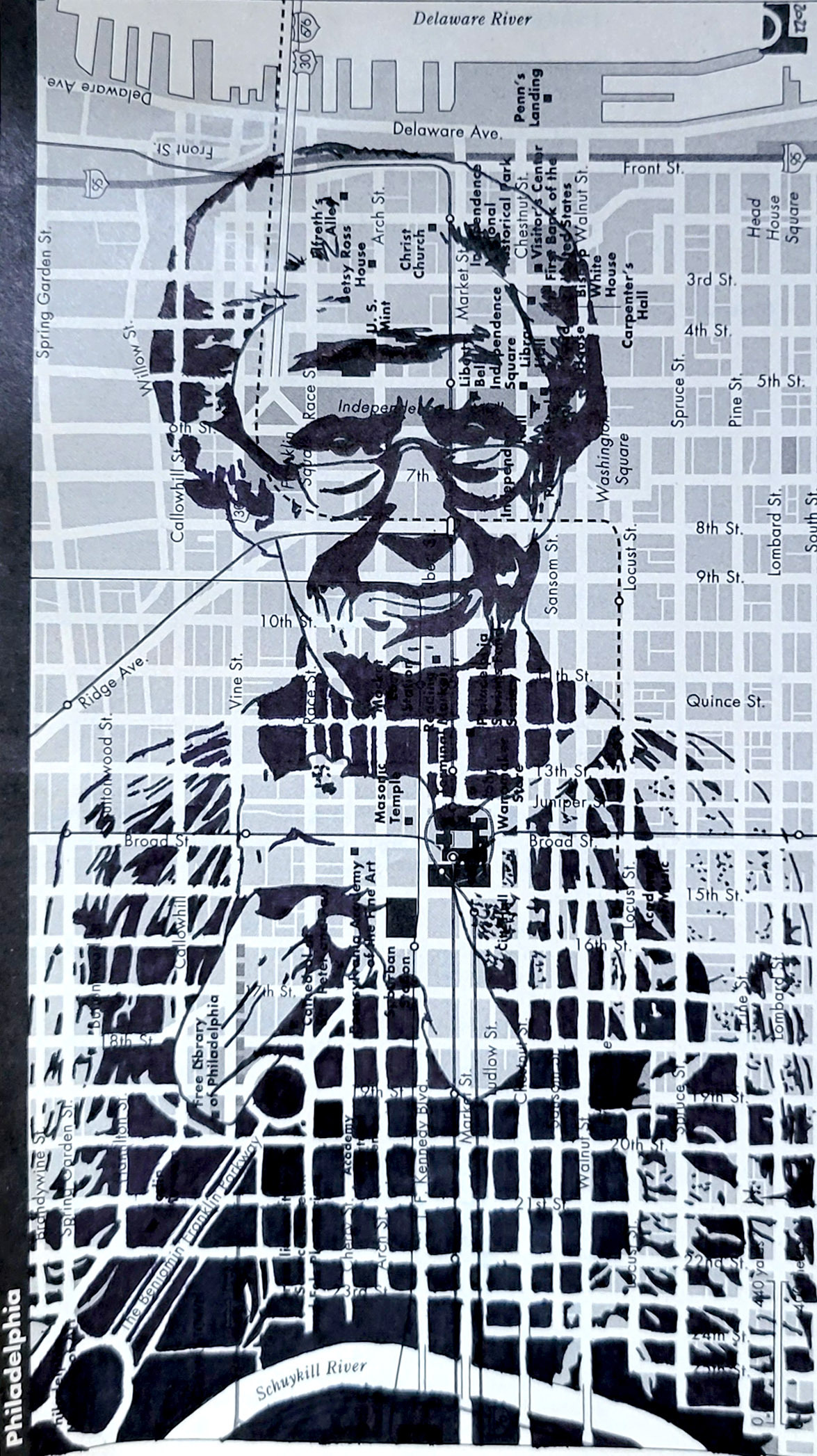
Tuesday May 17, 2022
Maggie Kuhn: Her most important work came after retirement
“Speak your mind, even if your voice shakes.”
Maggie Kuhn
Elder rights activist & founder of the Gray Panthers

The Artwork:
Maggie Kuhn’s portrait in the Fearless Portrait project consists of an ink drawing of her Ink drawing on a map of Philadelphia, PA, where she lived and worked.
The Story:
In 1970, Maggie Kuhn was working a job she loved at the Presbyterian Church when she was forced to retire due to the mandatory retirement age of 65. Despite 20 years of work for the church, her supervisors refused to let her stay on.
“I felt dazed. I was hurt and then, as time passed, outraged. Something clicked in my mind and I saw that my problem was not mine alone. Instead of sinking into despair, I did what came most naturally to me: I telephoned some friends and called a meeting,” she later wrote in her autobiography, No Stone Unturned, The Life and Times of Maggie Kuhn.
Each of the meeting attendees was also being forced into retirement. “We discovered we had new freedom as a result of retiring,” wrote Kuhn. “We had no responsibility to a corporation or organization. We could take risks, speak out. We said, ‘With this new freedom we have, let’s see what we can do to change the world.’”
So, Kuhn and her friends created a movement. Initially given the ungainly name of Consultation of Older and Younger Adults for Social Change, the group was dubbed the Gray Panthers by a talk show host who quipped they were as militant as the Black Panthers. The moniker stuck and the Gray Panthers quickly carved out an advocacy niche. One hundred people attended its first public meeting.
The Gray Panthers worked to fight the idea of “disengagement theory,” a popular idea in the 70s that argued old age involved a necessary separation from work, families, communities, and general society as a prelude to death.
Kuhn believed this was nonsense, saying, “The first myth is that old age is a disease, a terrible disease that you never admit you've got, so you lie about your age. Well, it's not a disease—it's a triumph. Because you've survived. Failure, disappointment, sickness, loss—you're still here.”
As a living refutation of the disengagement theory, Kuhn became a national celebrity, appearing on TV frequently and giving talks all over the US in her role as National Convener of the Panthers. She logged 100,000 miles annually, traveling from one event to another. Her grueling schedule was partly fueled through her motto of “do at least one outrageous thing a day.”
In a full circle moment for Kuhn, the Gray Panthers were ultimately successful in getting Congress to ban mandatory retirement for most jobs in 1986. President Ronald Reagan—then the oldest ever President of the United States, signed the law.
Still extant today, the Gray Panthers’ membership has declined as it faces stiff competition from AARP.
Background on Kuhn:
Although she founded the Gray Panthers in response to mandatory retirement in 1970, Kuhn began advocating for elder rights in 1961 as an extension of her lifelong interest in human rights.
Kuhn attributed her activism to her sociology classes in college, saying, “Sociology, for me, related the community to the individual, and showed us a way to act responsibly in groups.”
After attending the 1961 White House Conference on Aging in her professional capacity with the Presbyterian Church, she began visiting Presbyterian retirement homes and was dismayed with how she saw residents treated. As editor of the Presbyterian journal “Social Progress,” she encouraged church members to get involved with elder issues among a wide swath of social problems such as nuclear proliferation, gender equality and more.
After living a life of advocacy, her advice to activists interested in creating social change was to “Leave safety behind. Put your body on the line. Stand before the people you fear and speak your mind—even if your voice shakes. When you least expect it, someone may actually listen to what you have to say. Well-aimed slingshots can topple giants.”
Kuhn was born on August 3, 1095 in Buffalo, New York to a conservative middle class family. She died at her home in Philadelphia on April 22, 1995, at the age of 89.
Music:
This episode contains music by Geovane Bruno, Oleksii Kaplunskyi, Musictown, and Sergei Chetnertnykh.
Sources:
- Douglas, S. J. (2020, September 9). Opinion | The Forgotten History of the Radical ‘Elders of the Tribe.’ The New York Times. https://www.nytimes.com/2020/09/08/opinion/sunday/gray-panthers-maggie-kuhn.html
- Encyclopedia Britannica. (n.d.). Maggie Kuhn | American activist. https://www.britannica.com/biography/Maggie-Kuhn
- Folkart, B. A. (2019, March 5). Maggie Kuhn, 89; Iconoclastic Founder of Gray Panthers. Los Angeles Times. https://www.latimes.com/archives/la-xpm-1995-04-23-mn-58042-story.html
- Gray Panthers. (n.d.). Maggie Kuhn. Gray Panthers NYC. https://www.graypanthersnyc.org/maggie-kuhn
- Kuhn, M. (1991). No Stone Unturned: The Life and Times of Maggie Kuhn (1st ed.). Ballantine Books.
- Levy, C. (1995, April 23). Gray Panthers Co-Founder Maggie Kuhn Dies At 89. The Washington Post. https://www.washingtonpost.com/archive/local/1995/04/23/gray-panthers-co-founder-maggie-kuhn-dies-at-89/a7c55189-b388-4e95-aafe-0d7d9a9163a1/
- Roberts, S. V. (1986, October 18). HOUSE VOTES TO END MANDATORY RETIREMENT RULES. The New York Times. https://www.nytimes.com/1986/10/18/us/house-votes-to-end-mandatory-retirement-rules.html
- The National Women’s Hall of Fame. (2015, October 17). Kuhn, Maggie. National Women’s Hall of Fame. https://www.womenofthehall.org/inductee/maggie-kuhn/
- Wikipedia contributors. (2021, December 7). Gray Panthers. Wikipedia. https://en.wikipedia.org/wiki/Gray_Panthers
- Wikipedia contributors. (2022, February 1). Maggie Kuhn. Wikipedia. https://en.wikipedia.org/wiki/Maggie_Kuhn
- Your Dictionary. (n.d.). Maggie Kuhn. YourDictionary.Com. https://biography.yourdictionary.com/maggie-kuhn
No comments yet. Be the first to say something!